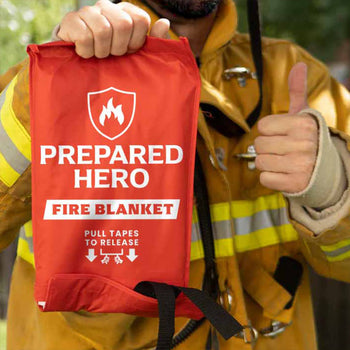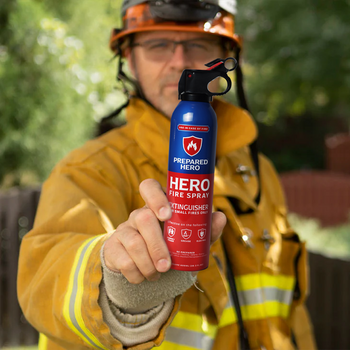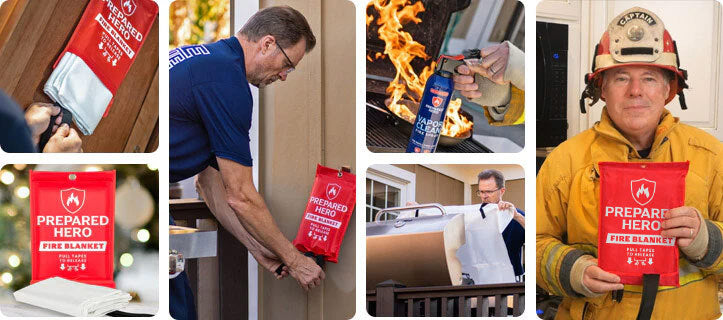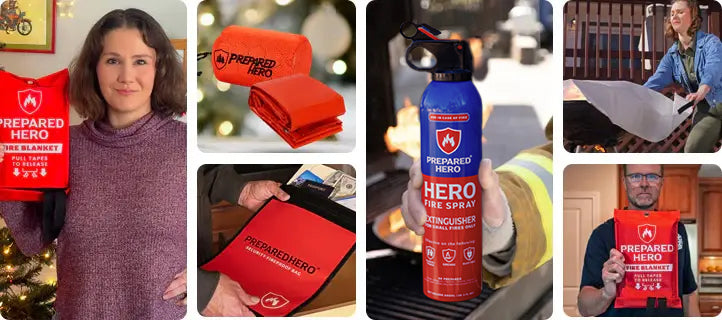Where you put your smoke detectors matters just as much as installing them. Proper placement makes sure they can detect...
Choosing the best type of smoke detector can be confusing to someone who's not aware of the different types. If you don't know where to start, we've got your back. In this post, we'll talk about the types of smoke detectors so you can decide which one's the best.
What Are the Three Types of Smoke Detectors?

The three types of smoke detectors are photoelectric, ionization, and combination. Photoelectric smoke detectors work best against smoldering fires, while ionization detectors work best against fast-flaming fires. Combination smoke detectors work on both. Let’s take a look at them in detail below:
Photoelectric Smoke Detectors
A photoelectric smoke detector works best on smoldering fires. These are slow, smoky fires that don’t produce a lot of flames right away. They also don’t flare up fast but can fill a room with smoke if you don’t catch them early. Instead of waiting for flames, a photoelectric smoke detector uses light to spot fires.
Here’s how it works: a small chamber with an LED light shines in a straight line. A photoelectric smoke detector also has a sensor positioned at an angle. When the air is clear, the light just keeps moving straight, and the sensor doesn’t pick up anything.
But when smoke sneaks into the chamber, its particles scatter the light in all directions. Some of that scattered light hits the sensor. When the sensor picks up enough of that scattered light, it triggers the alarm.
Another plus? They don’t go off every time you burn toast or take a hot shower. Because of how they’re designed, photoelectric detectors are less likely to be triggered by shower steam or cooking smoke. This makes them a smart pick for places like kitchens and bathrooms.
Ionization Smoke Detectors
An ionization smoke detector works best on fast-flaming fires. These are fires that produce a lot of flames but little smoke at first. They also spread fast because they produce huge flames. Instead of waiting for smoke, an ionization uses a tiny amount of radioactive material called americium-241 to ionize the air.
This material emits alpha particles, which ionize the air in the chamber. This process involves knocking electrons off air molecules to create positively charged atoms and free electrons. These charged particles then flow between the plates and create a small electric current.
When smoke enters the chambers, its particles attach to the ions, neutralize them, and disrupt the current. The detector then senses the current change and triggers the alarm. Ionization smoke detectors are usually more affordable than photoelectric smoke detectors. However, they’re more prone to false alarms because they're more sensitive to smoke particles.
Contrary to popular belief, the amount of americium inside is tiny (only about 1/5000th of a gram), so you don’t have to worry about radiation. It also lasts for decades because of its long half-life.
Dual-Sensor Smoke Detectors
As the term suggests, dual-sensor detectors use photoelectric and ionization technologies. They can detect different types of fires, including smoldering and flaming ones.
They're also just as responsive to smoldering and flaming fires as the two types mentioned above. However, dual-sensor smoke detectors are usually more expensive than photoelectric or ionization smoke detectors.
Some models go a step further and include carbon monoxide detectors, which detect smoke and the invisible and lethal carbon monoxide (CO). These devices are called combination smoke and carbon monoxide detectors. Most combination detectors use ionization or photoelectric sensors for smoke and electrochemical sensors for CO.
Some models even include voice alerts that tell you whether smoke or CO triggers the alarm. They also have useful features like test buttons, indicator lights, and LCD screens that display CO levels.
Is a Plug-in or Hardwired Smoke Detector Better?
Hardwired smoke detectors are usually better than plug-in smoke alarms. They’re more reliable because when one alarm gets triggered, the others do, too. This alerts everyone in the house, no matter where they are. However, the best choice still depends on your needs and living setup.
Plug-in smoke detectors are easy to install. Just plug them into a wall outlet, and they’re good to go. They work best for apartments or temporary setups. They also often include a battery backup in case the power goes out. Since they rely on outlet placement, their reliability might be limited. You have a problem if the outlet is not high enough to put the smoke detector on the ceiling. They also have to be plugged in all the time.
On the other hand, hardwired smoke detectors are directly connected to your home’s electrical system. The biggest perk? They’re interconnected. If one alarm goes off, they all do. They also have battery backups for power outages. However, they’re more difficult to install, especially if your home isn’t readily wired for them. You also need professionals for the installation.
If you have the budget and want the most reliable protection, hardwired detectors are the better choice. If you’re on a limited budget or renting, plug-ins are a decent option.
Do I Need an Ionization or Photoelectric Smoke Detector?

You need both ionization and photoelectric smoke detectors. Having two types of detectors gives you the highest level of protection. Each one is built to catch different kinds of fires.
But at the end of the day, the type of smoke detector you need depends on what you’re trying to protect against. Ionization smoke detectors are better at catching fast, flaming fires (like when a stack of newspapers suddenly catches fire and burns quickly). They react fast to small smoke particles. On the other hand, photoelectric smoke detectors work best against smoldering fires. These fires produce a lot of smoke but not much flame at first (like a cigarette burning on a couch). They're also less likely to get triggered by cooking smoke or steam, which makes them a solid pick for bedrooms, hallways, or bathrooms.
The safest choice is to use both. Some detectors combine both technologies into one unit, so you get the best of both worlds. This way, you’re covered no matter how a fire starts. If you want the most reliable setup, go with a combination smoke detectors or separate photoelectric and ionization smoke detectors placed in the right spots.
What Is the Difference Between Photoelectric and Optical Smoke Detectors?
There’s no difference between photoelectric and optical smoke detectors because they’re the same. The terms are also used interchangeably. Some people call them photoelectric detectors, while others say optical smoke alarms. Either way, they work the same way.
Photoelectric or optical smoke detectors work best at detecting smoldering fires (like when a couch starts burning). These fires produce a lot of smoke but few flames at first. Photoelectric smoke detectors can do this because they’re sensitive to large smoke particles.
An optical smoke detector uses light to detect smoke particles. It has a small chamber inside with an LED light that shines in a straight line. A photosensor is also found at an angle to the light beam, which detects scattered light.
The light beam passes through the chamber undisturbed when there’s no smoke. However, the light beam gets disrupted when smoke enters the chamber. The smoke particles scatter the light in different directions, and some of it hits the photosensor. Once the sensor detects enough scattered light, the alarm gets triggered.
Do Smoke Detectors Have to Be Hardwired?

Smoke detectors don’t always have to be hardwired. However, it’s a requirement in many places, especially for new homes or when doing major renovations. Hardwired smoke detectors are more reliable because they’re connected directly to your home’s electrical system. They also have backup batteries in case the power goes out.
Hardwired smoke detectors are also interconnected. If one goes off, the others will too. This gives you enough time to act no matter where the fire starts. If your area doesn’t require hardwired detectors, you can still get battery-powered models. While not interconnected, they can protect you from dangerous fires. Just make sure to replace the batteries at least once a year.
At the end of the day, you don’t always have to use hardwired detectors. However, they’re highly recommended for huge houses with multiple floors.
What Is the Best Sensor Type for a Smoke Detector?
The best sensors for smoke detectors are photoelectric and ionization. You need both because each sensor type detects different types of fires.
Ionization sensors are better at picking up fast, flaming fires (like when paper or grease catches fire suddenly). On the flip side, photoelectric sensors are more sensitive to slow, smoky fires (like a burning mattress). Each type covers a different danger, so using just one leaves a gap in fire safety.
Dual-sensor smoke detectors are also a smart choice. They have both ionization and photoelectric sensors built into one device. By having them, you’re covered no matter how the fire starts. You also don’t have to guess what kind of fire might happen.
Whether you install separate detectors or dual-sensor alarms, having both technologies in your home is the safest bet. Doing this helps keep you and your family covered from all angles.
Do Photoelectric Smoke Detectors Have More False Alarms?

No, photoelectric smoke detectors have fewer false alarms. That’s one of the reasons they’re popular. They’re designed to detect smoldering fires, which create a lot of smoke but fewer flames. Because they’re sensitive to large smoke particles, they’re less likely to be triggered by everyday stuff like cooking smoke or shower steam.
A photoelectric smoke detector uses a light beam and a sensor. When smoke enters, it scatters the light and sets off the alarm. It takes a decent amount of smoke to do that, so little puffs from burnt toast or steam from boiling water don’t trigger it. This makes photoelectric alarms a great choice for kitchens and bathrooms where other detectors might go off easily.
Do You Really Need to Replace Smoke Detectors Every 10 Years?
Yes, you need to replace your smoke detectors every 10 years. Smoke detectors are made to last for up to a decade, and they become unreliable after the said period. Over time, they become less sensitive, which means they won’t detect smoke properly. This gives you more false alarms and a false sense of security. Always check the manufacturing date on your detector and replace it if it’s over 10 years old.
Smoke detectors might also not work before the 10-year mark. If yours randomly goes off in the middle of the night or beeps even with new batteries, have a technician check it. If they can’t fix it, replace your smoke detector right away. Remember, it’s better to spend now than more on fire damage repairs later.
Which Is the Best Smoke Detector?

The best smoke detector depends on your specific needs and home setup. For instance, if you have a huge house with many floors, consider a mix of photoelectric and ionization detectors in different areas. You can place photoelectric detectors in your kitchen and bathrooms and ionization detectors in your living area and bedrooms. If you’re up for it, you can install dual-sensor smoke detectors, which cover slow and fast fires. Although they're more expensive, the peace of mind you'll get is worth the investment.
Conclusion
Knowing the different types of smoke detectors helps you make the best choice. Photoelectric detectors detect slow fires, while ionization detectors detect fast ones. On the other hand, dual-sensor detectors offer the best coverage but with higher price tags.
Aside from having working smoke alarms, having fire prevention tools like fire blankets, fire sprays, flame shields, and fire protection gloves is a must. If you want reliable, easy-to-use, and affordable tools to put out small fires before they spread, we’re here to help. Check out Prepared Hero’s fire prevention tools here, and get up to 51% off on certain items. Stay prepared, hero!


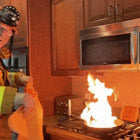 Fire
Fire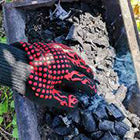 Safety
Safety Survival
Survival Protection
Protection New
New
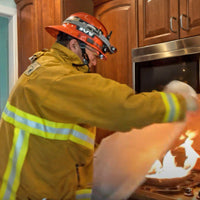 Fire
Fire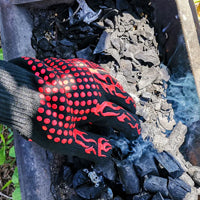 Safety
Safety Survival
Survival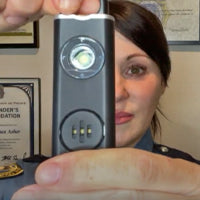 Protection
Protection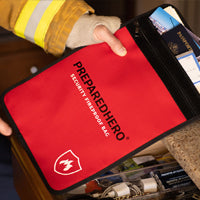 New
New
